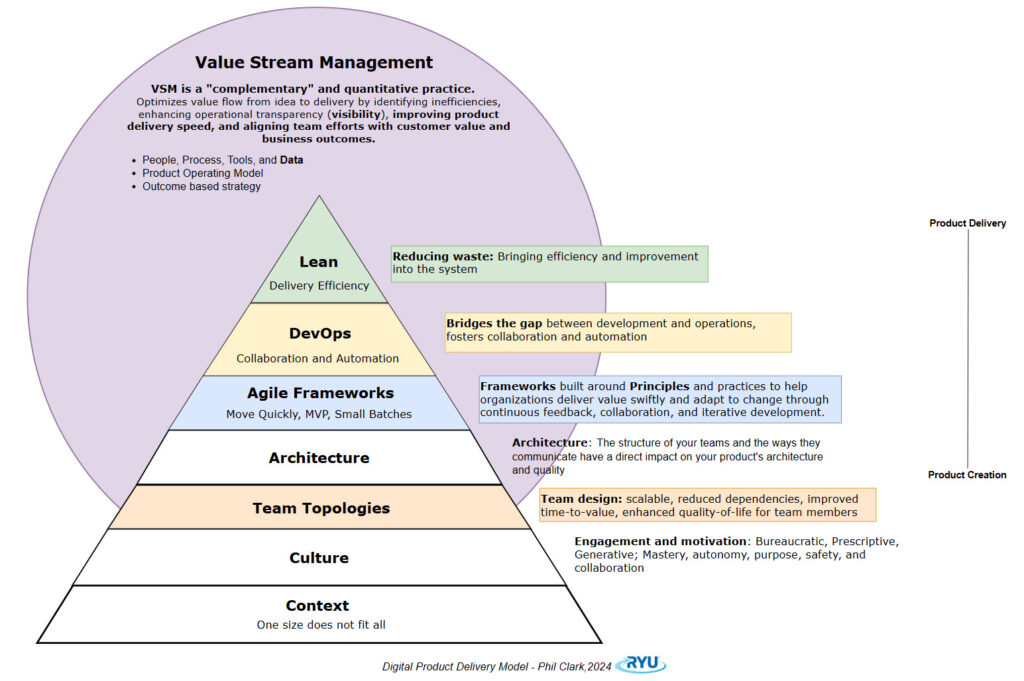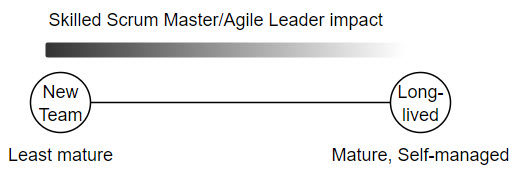9 min read

This post is part of my ongoing series showcasing the competitive edge provided by maintaining Scrum Master or Agile Leader roles within teams. If you’d like to read more, please review the related posts section at the end of this article.
Value Stream Management
Value Stream Management doesn’t require you to transform your software delivery practices beforehand or adopt Agile, Lean, or DevOps practices first. It provides visibility into how you ideate, plan, create, and deliver digital products or services. It optimizes the time spent on these tasks by automating and standardizing the workflow from ideation to production and operation. Based on the insights, you can discuss, decide, and experiment with frameworks and practices to improve your system and workflow. I discovered Value Stream Management in late 2020 and introduced it to my department in 2021, after more than six years into our digital evolution. VSM is a natural complement to our Agile, Lean, and DevOps initiatives.

Like Agile, DevOps, and Lean practices, Value Stream Management (VSM) demands organizational understanding, alignment, and expertise. Successful adoption of VSM requires everyone to understand its purpose, benefits, and implementation. Subject matter experts play a crucial role in this process. Introducing dedicated VSM roles—such as Value Stream Managers, Value Stream Architects, and Flow Advisors—is essential for ensuring continuous value delivery and operational efficiency.
Expertise can be sourced externally, identified within the organization, or cultivated through strategic investment. Unlike the early attempts to transition teams from waterfall to agile by merely rebranding Project Managers or Business Analysts as Product Managers or Product Owners, these new roles are distinct and require dedicated training and development. Investing in this development is essential for success.
These new roles can be added to the organization, departments, or current members of cross-functional delivery teams. This article supports the cross-functional team option, recommending that Agile Leaders in cross-functional teams are a great option and can be trained as their teams’ VSM and Flow experts. We are testing the idea of developing VSM skills and expanding the responsibilities of Agile Leaders or Scrum Masters within our cross-functional delivery teams.
The Conversation
A VSM colleague, Patrice Corbard, shared an insightful observation based on published results about Scrum Master maturity in a community Slack message. While I am still determining the research methods used or the accuracy of the research findings representation of the industry, the discussion it sparked was quite interesting. Patrice highlighted that only 8% of Scrum Masters can optimize product value streams. He posed three questions:
- Are you surprised by this very low proportion?
- What are the benefits of the value streams approach to get scrum masters interested in the subject, particularly in these difficult times when agile coaching roles are being called into question?
- What do you suggest to change the game and motivate scrum masters and their leaders/managers?
This inspired me to share how, I have been enhancing the Scrum Master/Agile Leader role by integrating VSM knowledge, experience, and responsibilities.
From the ScrumMatch website:
Scrum maturity reflects the capability to leverage Scrum to deliver increased business value more efficiently. ScrumMatch evaluates the Scrum maturity of both Scrum Masters and organizations, providing transparency so each can understand how well they align with each other’s needs and expectations. A Scrum Master’s maturity level is displayed on their profile, rated on a 7-point scale from low to high maturity. 1, 2
Here is my summary of their findings. The top three points on the current state of Scrum Master maturity are:
- Substantial Proportion Lack True Scrum Mastery: 38% of candidates fail to exhibit the essential qualities of a proficient Scrum Master.
- Most Candidates Are Still Developing Foundational and Applied Skills: 37% of candidates are at the intermediate level, with 10% possessing foundational knowledge, 13% understanding and applying Scrum principles, and 14% starting to enhance their Scrum practices.
- Limited Advancement to High Organizational Impact: A small percentage achieve higher maturity levels. Specifically, 14% utilize Scrum to enhance product development, 8% focus on optimizing the product value stream, and only 3% can optimize the entire organization.
First Question
“Are you surprised by this very low proportion?”
These findings don’t surprise me; they align with my experiences. Similar to the Product Owner role, The Scrum Master or Agile Leader team role is crucial. Enhancing its value and bringing it to maturity requires continuous investment in learning and hands-on experience. This dedication is essential for adding value to the team.
I attribute the questioning of the value and maturity level of Scrum Masters to several key factors: the commercialization of certifications (ease of access and proliferation of certification mills), the expertise and mindset of senior leadership or executive sponsors (entrenched or outdated perspectives), investment in continuous training, and hands-on practical experience.
Like other team roles, new Scrum Masters and Agile Leaders need time to develop their skills and gain experience. This should be complemented by continuous investment in learning and growth.
Second Question
“What are the benefits of the value streams approach to get scrum masters interested in the subject, particularly in these difficult times when agile coaching roles are being called into question?”
Starting with the second part of Patrice’s second question, which points to the industry debate on Agile and the value of the Scrum Master/Agile Leadership role, this topic commands a separate discussion beyond the scope of this article, and I will be brief.
Many agile or digital transformation struggles and failures can be traced to leadership, prevailing mindsets, and experiences. However, I agree that the role of the Scrum Master has been diluted by the proliferation of accelerated certifications and the commercial aspects surrounding them. This trend has undermined the significance of the Scrum Master’s responsibilities and their potential to make a meaningful impact on cross-functional software delivery teams.
Do we need the Scrum Master/Agile Leader role?
Your organization and team design will decide.
First-time product owners need time, trust, and support to grow into their new role. – Roman Pichler
This quote applies to Scrum Masters, Agile Leaders, and Product Owners or Product Managers. These roles add value as they gain knowledge and experience and improve their skills and trust in their teams.
My responsibilities include team design, systems thinking, and delivering high-quality technology quickly. Although I have extensive experience in agile delivery, I am not a Scrum Master and have never held that role. However, I have led and mentored our agile leadership team and am a strong advocate for its value within cross-functional delivery teams.
Conversely, as we progress through decades of digital transformation and move away from traditional waterfall methods, the benefits of Agile practices and the role of Scrum Masters are increasingly debated. Many organizations still struggle with Agile transformations, often concluding that Agile falls short, leading them to cut Scrum Master positions and similar roles from their budgets.
Industry experts, such as the highly esteemed Marty Cagan, argue in his latest book “Transformed” and in related interviews that these roles, as currently defined, are either redundant or lack substantial value. As I interpreted it, Cagan asserts that the responsibilities typically assigned to Scrum Masters should fall to other team members, particularly the Product Manager. I can only partially agree with this suggestion when teams have evolved to mature self-managed levels.

Third Question
“What do you suggest to change the game and motivate scrum masters and their leaders/managers?”
I will combine my response to the first part of question two, “”What are the benefits of the value streams approach to get scrum masters interested in the subject” and question three.
Evolving the Scrum Master/Agile Leader role with VSM
I appreciate that the role of the Scrum Master/Agile Leader remains impartial and uninfluenced by any particular type of the team’s work — be it feature development, technical debt, defect resolution, or security risk. This neutrality allows for a balanced and objective focus on the team’s success. While other team roles have specific areas of focus, the Scrum Master is uniquely positioned to ensure the overall health and performance of the team, utilizing tools like Value Stream Management and Flow Metrics.
Motivation stems from the Scrum Master’s or Agile Leader’s commitment to the team’s overall performance. The primary responsibility of a Scrum Master or Agile Leader on a cross-functional delivery team is to enhance team effectiveness and support greater efficiency. This involves managing rituals, team health, performance metrics, retrospectives, and collaboration. By leveraging Agile and Lean methodologies and incorporating Value Stream Management (VSM), as I propose, these leaders can achieve these goals more effectively. With executive sponsorship and support, the Scrum Master or Agile Leader is ideally positioned to lead VSM initiatives, focusing on the team’s overall success rather than specific product features or technical solutions.
Delivery optimization and oversite responsibilities are natural progressions of responsibility for Agile Leaders. One way to achieve this is through Value Stream Management (VSM), which analyzes the product creation and delivery process. Each team member should understand VSM principles, and having a subject matter expert on the team enhances delivery efficiency and customer satisfaction. Integrating VSM oversight into the role of Scrum Master or Agile Leader helps optimize team performance and align efforts with business objectives, ultimately improving the delivery of business value.
Benefits:
- Holistic Team Focus:
By integrating VSM, the Scrum Master can oversee and enhance the entire workflow, ensuring all processes contribute effectively to delivering value. This comprehensive perspective complements the Scrum Master’s focus on team health and performance. - Enhanced Process Efficiency:
VSM helps identify bottlenecks and inefficiencies in the delivery process. A Scrum Master with VSM responsibilities can facilitate improvements across the value stream, leading to faster and more reliable delivery of products. - Balanced Work Prioritization:
The Scrum Master can leverage VSM to encourage teams to balance work priorities more effectively. This ensures that feature development, technical debt, defect resolution, and security risks are all addressed appropriately. This can provide a more even distribution of effort and attention across different types of work. - Improved Metrics and Insights:
Integrating VSM allows the Scrum Master to track flow metrics and other key performance indicators that provide deeper insights into the team’s productivity and areas for improvement. This data-driven approach fosters continuous improvement initiatives and enables teams to identify actionable steps for enhancement. - Enhanced Collaboration and Communication:
With a focus on the entire value stream, the Scrum Master can better facilitate collaboration and communication between different team members and stakeholders, ensuring everyone is aligned on goals and processes. - Strategic Alignment:
By managing the value stream, the Scrum Master can ensure that the team’s work aligns with the organization’s strategic objectives, enhancing the overall value delivered to customers and stakeholders.
Challenges
Integrating Value Stream Management (VSM) into Agile Leadership tackles the growing complexity of digital product environments. This approach requires a comprehensive perspective on product delivery and team efficiency beyond traditional task execution. However, VSM is still in its early adoption phase in the industry. Despite its strategic importance, expertise in optimizing value streams is scarce in the job market. Organizations like the one I led take proactive steps by recommending and providing VSM training to their Agile Leaders. VSM adoption necessitates investing in training, experimentation, and collaboration with industry experts.
Organizational Impact and Future Prospects
Adding Value Stream Management capabilities elevates how software product delivery teams and their leaders perceive their contributions to organizational goals. By emphasizing continuous improvement and strategic value creation, Scrum Masters and Agile Leaders can be better equipped through VSM to influence and elevate cross-functional team performance and organizational outcomes. This transformation tackles some of the immediate skills gaps identified by ScrumMatch. It establishes a new benchmark for the capabilities of Agile practitioners’ responsibilities and overall team value, clarity, and flow.
Integrating Value Stream Management into the Agile Leadership role marks a significant evolution in Agile team practices. It bridges a crucial gap, enabling Agile practitioners to link their team’s daily activities with strategic business outcomes. Organizations embracing this approach will likely experience increased agility, better alignment with business goals, and superior performance, positioning them to tackle future challenges and seize opportunities more effectively.
References
- ScrumMatch, https://scrumatch.com/, Understanding Scrum Maturity, https://scrummatch.com/en/support/understanding-scrum-master-maturity
- ScrumMatch LinkedIn post, April 2024, https://www.linkedin.com/posts/scrummatch_hr-recruiting-scrummaster-activity-7183423788401762304-psjP?utm_source=share&utm_medium=member_desktop
- Scrum Masters play a role, LinkedIn Post, https://www.linkedin.com/posts/patricecorbard_hr-recruiting-scrummaster-activity-7185600586954788864-0FmS?utm_source=share&utm_medium=member_desktop, Patrice Corbard, April 2024.
Resources and Recommendations
- Value Stream Management — To learn more about Value Stream Management, visit the Value Stream Management Consortium at https://www.vsmconsortium.org/ and consider becoming a member. I highly recommend the “Value Stream Management Foundation” course for members, which is required for our Agile Leaders.
- Patrice Corbard – To learn more about Patrice and his insights on this and similar topics, please check out his monthly publishing at https://sdrefocus.com/index.php/value-driven-news/
Related Posts
- Beyond Facilitation: The Agile Leader’s Place in Cross-Functional Team Dynamics. February 25, 2024.
- Agile Software Delivery: Unlocking Your Team’s Full Potential. It’s not the Product Owner. December 29, 2022.
Poking Holes
I invite your perspective on my posts. What are your thoughts?.
Let’s talk: [email protected]








